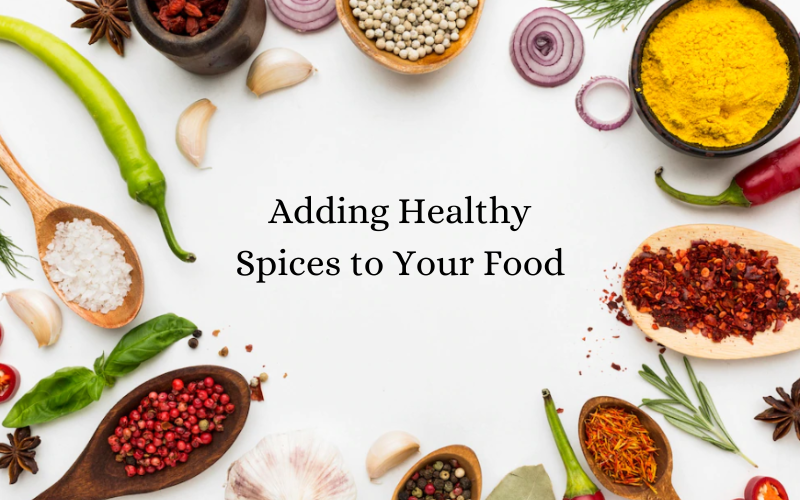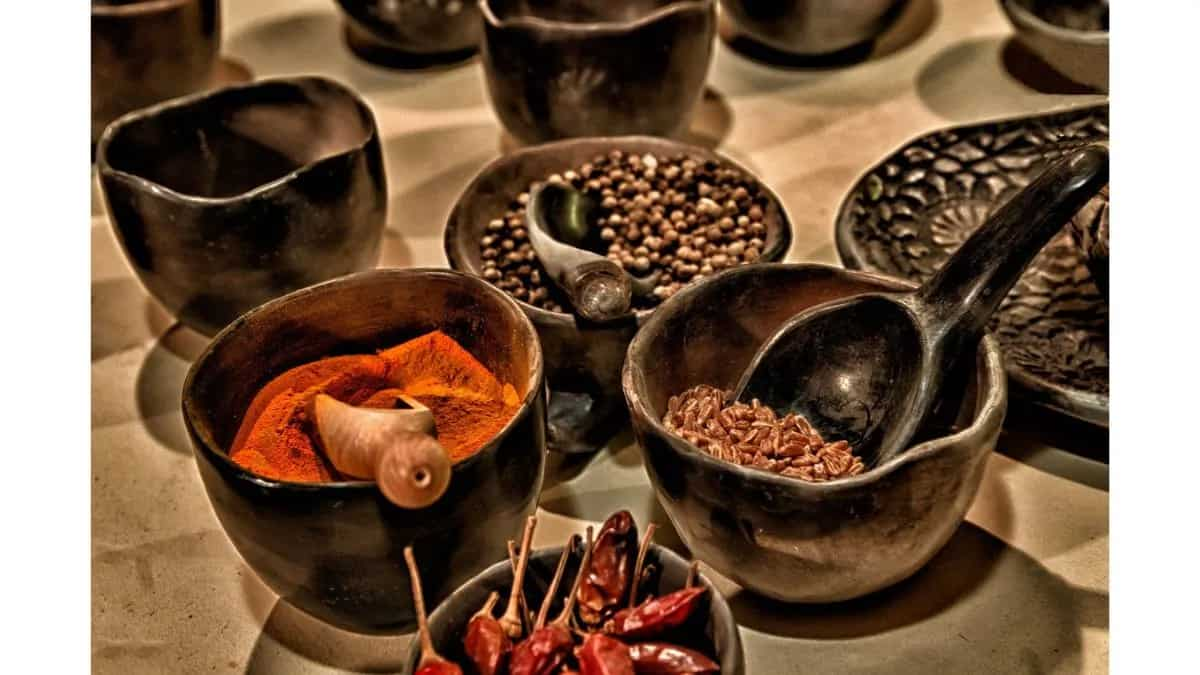
Why Spicing Up Your Meals Is Healthy According to Science
Why spicing up your meals is healthy according to science? It’s not just about flavor, though spices certainly bring that to the table. They also offer a wealth of health benefits, from boosting digestion to fighting inflammation and even protecting against chronic diseases.
Imagine a world where your favorite dishes not only taste delicious but also contribute to your overall well-being. That’s the power of spices. They are nature’s hidden gems, packed with potent compounds that can enhance your health and make you feel your best.
The Power of Spices

Beyond adding vibrant flavors to our dishes, spices have been used for centuries for their medicinal properties and potential health benefits. These aromatic additions can stimulate our digestive system, boost metabolism, and even contribute to weight management. Let’s delve deeper into the science behind these benefits.
The Impact of Spices on Digestion
Spices play a crucial role in stimulating digestion and promoting gut health. They contain compounds that can increase saliva production, aid in the breakdown of food, and promote the release of digestive enzymes.
- Ginger: This popular spice is known for its anti-inflammatory properties and ability to soothe nausea. It also helps to stimulate the production of digestive juices, aiding in the breakdown of food.
- Turmeric: This bright yellow spice contains curcumin, a potent antioxidant with anti-inflammatory properties. Curcumin can also stimulate the production of bile, which is essential for fat digestion.
- Peppermint: This refreshing spice is known for its ability to relax the muscles of the digestive tract, which can help to alleviate bloating, gas, and indigestion.
- Cinnamon: This warm spice has been shown to improve blood sugar control and may also aid in digestion.
Spices and Metabolism
Certain spices can influence metabolism and increase calorie expenditure, potentially aiding in weight management.
- Cayenne Pepper: This spicy pepper contains capsaicin, a compound that can increase thermogenesis, the process by which the body burns calories for heat. Studies have shown that capsaicin can also suppress appetite and promote fat oxidation.
- Black Pepper: This common spice contains piperine, a compound that has been shown to enhance the absorption of nutrients and increase thermogenesis.
- Garlic: This pungent spice contains allicin, a compound with antioxidant and anti-inflammatory properties. It may also help to regulate blood sugar levels and boost metabolism.
Spices and Weight Management
Research suggests that incorporating spices into your diet can contribute to weight management by promoting satiety, reducing appetite, and boosting metabolism.
A study published in the journal “Appetite” found that participants who consumed a meal containing chili pepper experienced a significant reduction in appetite and calorie intake compared to those who did not.
Another study published in the “Journal of the American College of Nutrition” found that consuming ginger daily for 12 weeks resulted in a significant reduction in body weight and waist circumference in overweight and obese individuals.
Spices and Inflammation: Why Spicing Up Your Meals Is Healthy According To Science
Inflammation is a natural process that helps your body heal from injuries and fight infections. However, chronic inflammation, which occurs when inflammation lasts for a long time, can contribute to a range of health problems, including heart disease, cancer, and Alzheimer’s disease.
Spices, with their powerful anti-inflammatory properties, offer a natural way to combat chronic inflammation and promote overall well-being.
The Anti-inflammatory Power of Spices
Spices contain potent compounds that have been shown to effectively reduce inflammation. These compounds, such as curcumin in turmeric, capsaicin in chili peppers, and gingerol in ginger, work by targeting various inflammatory pathways in the body. Here are some specific examples of spices and their anti-inflammatory properties:
- Turmeric:Curcumin, the active compound in turmeric, has been extensively studied for its anti-inflammatory effects. It inhibits the production of inflammatory molecules, such as TNF-alpha and IL-6, and has been shown to be as effective as some anti-inflammatory drugs in reducing inflammation.
Adding spices to your meals isn’t just about flavor, it’s a science-backed way to boost your health! Certain spices can help regulate blood sugar, reduce inflammation, and even improve digestion. But when it comes to weight loss, does meal timing matter for losing weight ?
While timing can play a role, focusing on whole, unprocessed foods with a healthy dose of spices is a surefire way to fuel your body and support your overall well-being.
- Ginger:Gingerol, the main bioactive compound in ginger, possesses potent anti-inflammatory properties. It has been found to reduce inflammation in various tissues, including the joints, muscles, and digestive tract.
- Chili Peppers:Capsaicin, the compound that gives chili peppers their heat, has been shown to reduce inflammation by blocking the release of inflammatory mediators.
- Cinnamon:Cinnamon contains cinnamaldehyde, a compound that has anti-inflammatory effects. It has been shown to reduce inflammation in the brain, heart, and other organs.
- Garlic:Garlic contains allicin, a compound with potent anti-inflammatory properties. It has been shown to reduce inflammation in the cardiovascular system and the digestive tract.
Spices and Chronic Inflammation
Chronic inflammation is a key contributor to the development of many chronic diseases, including heart disease, cancer, diabetes, and arthritis. Spices, with their ability to reduce inflammation, can play a significant role in mitigating these diseases.Studies have shown that incorporating spices into your diet can help reduce chronic inflammation and improve overall health.
Adding a dash of spice to your meals isn’t just about taste, it’s about boosting your health. Research shows that spices like turmeric and ginger can help with inflammation and digestion. And if you’re looking for a way to work up an appetite for those flavorful meals, check out everything you need to know about ultra walking.
It’s a fantastic way to get your heart pumping and build endurance. After a long ultra walk, a spicy meal will feel like a delicious reward!
For instance, regular consumption of turmeric has been linked to a lower risk of heart disease and cancer. Ginger has been shown to reduce pain and inflammation associated with arthritis.
Spices and Immune System Health, Why spicing up your meals is healthy according to science
A robust immune system is crucial for defending against infections and diseases. Spices, with their anti-inflammatory and antioxidant properties, can contribute to a healthy immune system. Spices like turmeric, ginger, and garlic have been shown to boost immune function by stimulating the production of white blood cells, which are essential for fighting infections.
These spices also have antioxidant properties, which protect cells from damage caused by free radicals.
Spices and Disease Prevention
The anti-inflammatory properties of spices have been linked to the prevention and management of various chronic diseases. For example, regular consumption of turmeric has been associated with a lower risk of heart disease, cancer, and Alzheimer’s disease. Ginger has been shown to be effective in reducing pain and inflammation associated with arthritis.
“The use of spices in traditional medicine and culinary practices highlights their potential health benefits, including anti-inflammatory properties.”
Spices
Spices are not only culinary delights but also potent sources of antioxidants, offering a powerful shield against cellular damage and contributing to overall well-being. These natural compounds, often found in vibrant hues and aromatic profiles, possess remarkable properties that can enhance our health and longevity.
Antioxidant Powerhouses
Antioxidants are essential molecules that combat free radicals, unstable molecules that can damage cells and contribute to aging and disease. Many spices are rich in antioxidants, including:
- Turmeric:Curcumin, the active compound in turmeric, is a potent antioxidant that has been shown to reduce inflammation and protect against cell damage. It is believed to play a role in preventing cancer, heart disease, and Alzheimer’s disease.
- Cinnamon:Cinnamon contains cinnamaldehyde, an antioxidant that may help regulate blood sugar levels, lower cholesterol, and protect against heart disease. Studies have also suggested that cinnamon may have anti-inflammatory and anti-cancer properties.
- Ginger:Gingerol, the active compound in ginger, has been linked to numerous health benefits, including reducing nausea, easing muscle pain, and protecting against oxidative stress. Ginger’s antioxidant properties may contribute to its ability to fight inflammation and reduce the risk of chronic diseases.
- Cloves:Eugenol, the primary compound in cloves, is a potent antioxidant with anti-inflammatory, antibacterial, and antifungal properties. It may help protect against cancer, heart disease, and infections.
- Oregano:Oregano is rich in antioxidants, including rosmarinic acid and carvacrol, which have been shown to have anti-inflammatory, antibacterial, and antiviral effects. It may help boost the immune system and protect against oxidative stress.
Protecting Cells from Damage
Antioxidants work by neutralizing free radicals, preventing them from damaging cell structures and DNA. This protective action helps maintain cellular integrity, reduce inflammation, and promote overall health.
Did you know that adding spices to your meals can actually boost your metabolism and fight inflammation? It’s true! And while it’s great to spice up your everyday meals, who doesn’t love a good pizza now and then?
If you’re looking for some healthier pizza options, check out this list of 11 healthy pizzas under 400 calories – you can still enjoy your favorite food while staying mindful of your health. And don’t forget, adding a pinch of chili flakes or a sprinkle of oregano to your pizza can make it even more flavorful and healthy!
“Antioxidants are like superheroes for our cells, fighting off the damaging effects of free radicals and keeping us healthy.”
Health and Longevity
The antioxidant properties of spices contribute to overall health and longevity by:
- Reducing Inflammation:Chronic inflammation is linked to many diseases, including cancer, heart disease, and arthritis. Spices like turmeric, ginger, and cinnamon have anti-inflammatory properties that can help reduce inflammation and protect against these diseases.
- Improving Heart Health:Spices like cinnamon and ginger can help lower cholesterol levels, improve blood circulation, and reduce the risk of heart disease. Studies have shown that regular consumption of spices can contribute to a healthier cardiovascular system.
- Boosting Immunity:Spices like garlic, oregano, and cloves have antimicrobial and antiviral properties that can help strengthen the immune system and protect against infections. They may also help reduce the duration and severity of colds and flu.
- Promoting Brain Health:Spices like turmeric and cinnamon have been linked to improved cognitive function and reduced risk of neurodegenerative diseases like Alzheimer’s disease. Their antioxidant properties may help protect brain cells from damage and promote memory and learning.
Cancer Prevention
Studies have shown that certain spices may have cancer-preventive properties. For example:
- Turmeric:Curcumin has been shown to inhibit the growth of cancer cells in laboratory studies. It may also help prevent the spread of cancer and reduce the side effects of chemotherapy.
- Garlic:Garlic contains allicin, a compound that has been linked to reduced risk of certain cancers, including stomach, colorectal, and breast cancer. Studies suggest that allicin may help inhibit the growth of cancer cells and induce apoptosis (programmed cell death) in cancer cells.
- Ginger:Gingerol has been shown to have anti-cancer properties in laboratory studies. It may help prevent the growth and spread of cancer cells and reduce the risk of certain cancers, including colorectal and breast cancer.
Spices and Flavor: A Culinary Symphony
Spices are more than just flavor enhancers; they are the orchestra conductors of our taste buds, orchestrating a symphony of aromas and sensations that elevate our dining experiences. The diverse range of spices, each with its unique flavor profile and potential health benefits, allows us to create culinary masterpieces that are both delicious and nutritious.
Spice Profiles and Health Benefits
The world of spices is a vibrant tapestry of flavors, each contributing its own unique character to our dishes. Here is a glimpse into the flavor profiles and potential health benefits of some popular spices:
| Spice | Flavor Profile | Potential Health Benefits |
|---|---|---|
| Cinnamon | Warm, sweet, and slightly woody | May help regulate blood sugar levels, reduce inflammation, and support heart health. |
| Turmeric | Earthy, slightly bitter, and pungent | Contains curcumin, a potent anti-inflammatory compound, and may also have antioxidant and anti-cancer properties. |
| Ginger | Spicy, warming, and slightly sweet | May aid digestion, reduce nausea, and have anti-inflammatory properties. |
| Garlic | Strong, pungent, and slightly sweet | May boost the immune system, lower blood pressure, and have anti-cancer properties. |
| Cayenne Pepper | Hot, spicy, and pungent | May help burn calories, reduce appetite, and improve circulation. |
| Cumin | Warm, earthy, and slightly bitter | May aid digestion, reduce inflammation, and have antioxidant properties. |
| Oregano | Herbaceous, slightly bitter, and pungent | May have antimicrobial and antioxidant properties. |
Incorporating Spices into Everyday Meals
Adding spices to your everyday meals is a simple yet powerful way to enhance flavor and boost nutrition. Here are some tips to get you started:
- Start with small amounts and gradually increaseto find your preferred level of spiciness.
- Experiment with different spice combinationsto create unique and flavorful dishes.
- Use spices in both sweet and savory dishes, from curries and stews to desserts and baked goods.
- Add spices at different stages of cooking, such as toasting whole spices before grinding them, adding them at the beginning of cooking to infuse the dish, or sprinkling them on top as a garnish.
- Store spices properlyin airtight containers in a cool, dark place to preserve their flavor and potency.
Creating Flavorful and Healthy Dishes with Spices
Here’s a recipe that showcases the versatility of spices and their ability to create flavorful and healthy dishes:
Spiced Lentil and Vegetable Curry
Ingredients:* 1 tablespoon olive oil
- 1 onion, chopped
- 2 cloves garlic, minced
- 1 inch ginger, grated
- 1 teaspoon ground cumin
- 1 teaspoon ground coriander
- 1/2 teaspoon turmeric
- 1/4 teaspoon cayenne pepper
- 1 (15-ounce) can diced tomatoes, undrained
- 1 cup red lentils, rinsed
- 2 cups vegetable broth
- 1 cup chopped vegetables (such as carrots, potatoes, and cauliflower)
- Salt and pepper to taste
- Fresh cilantro, chopped, for garnish
Instructions:
- Heat olive oil in a large pot over medium heat. Add onion, garlic, and ginger and cook until softened, about 5 minutes.
- Add cumin, coriander, turmeric, and cayenne pepper and cook for 1 minute, stirring constantly.
- Stir in tomatoes, lentils, vegetable broth, and chopped vegetables. Bring to a boil, then reduce heat to low, cover, and simmer for 20-25 minutes, or until lentils are tender.
- Season with salt and pepper to taste.
- Garnish with fresh cilantro and serve with rice or naan bread.
This recipe demonstrates how spices can be used to create a flavorful and satisfying curry dish. The combination of cumin, coriander, turmeric, and cayenne pepper adds warmth, depth, and a touch of heat, while the lentils and vegetables provide protein, fiber, and essential nutrients.
Epilogue

So, the next time you’re in the kitchen, don’t just reach for the salt and pepper. Explore the vibrant world of spices, and let their flavors and health benefits transform your meals into culinary masterpieces. Embrace the power of spices and unlock a healthier, more vibrant you.






